

On the Nature and Scope of Habits and Model-Free Control. One of the oldest and most entrenched ideas in the cognitive sciences is that actions can be “stamped in” by past reinforcement.
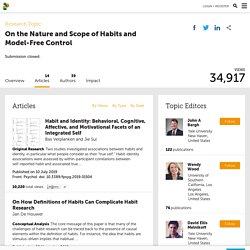
Once stamped in, an action can be initiated without knowledge of the causal relationship between the action and its outcomes, and without any current desire to obtain its outcomes. ... One of the oldest and most entrenched ideas in the cognitive sciences is that actions can be “stamped in” by past reinforcement. Once stamped in, an action can be initiated without knowledge of the causal relationship between the action and its outcomes, and without any current desire to obtain its outcomes. Such actions are called habits. The past ten years have seen a sharp divergence of opinion about the nature of habits and the extent to which habits shape human cognition and behavior. The goal of this Research Topics is to bridge the rapidly expanding divide in the literature on habits. N.B. Keywords: Habits, Dual-Process, Model-Free, Model-Based, Reinforcement Learning. On the Nature and Scope of Habits and Model-Free Control.
How to Build a Healthy Habit. Conventional wisdom tells us that it takes about four weeks to build a habit.
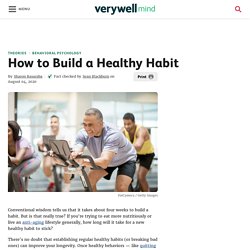
But is that really true? If you're trying to eat more nutritiously or live an anti-aging lifestyle generally, how long will it take for a new healthy habit to stick? There's no doubt that establishing regular healthy habits (or breaking bad ones) can improve your longevity. Once healthy behaviors — like quitting smoking, drinking only in moderation, or getting regular exercise — are entrenched into your regular schedule, you're more likely to do them consistently. Habit and Identity: Behavioral, Cognitive, Affective, and Motivational Facets of an Integrated Self. Introduction What determines our identity?
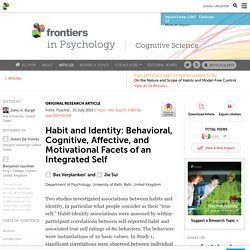
A potential source of identity, which has received little attention in the literature on the self and the self-concept, is the array of our habits. A large portion of everyday behavior is habitual, that is, being performed frequently, often automatically, and in stable contexts (e.g., Verplanken and Aarts, 1999; Wood et al., 2002; Gardner, 2015; Verplanken, 2018). Habits vary in a number of ways. One is complexity; some habits involve simple acts, such as nail biting or checking the time, while others are part of more complex behaviors or routines, such as donating to charity or exercising.
Wellness App Helping Millions Create and Cement Good Habits Launches Free Life Well Balanced Journey to Enable Users to Moderate Digital Engagement. “Using our resources and experience driving effective habit change through Fabulous, our Life Well Balanced journey is designed to help people engage meaningfully with the world outside of their device,” says Fabulous Founder and CEO Sami Ben Hassine.

DURHAM, N.C. (PRWEB) May 18, 2018 Fabulous, a habit change app with millions of users around the globe, has launched a behavioral science tested 30 day life well-balanced journey providing users a path to relinquish the control personal mobile and computing devices have on daily life. Incubated at Duke University’s Center for Advanced Hindsight in Durham, North Carolina with the help of renowned professor of psychology and behavioral economics Dan Ariely, the Fabulous app has experienced phenomenal growth in the past year, and has become the go-to mobile coach for people to make reliable change in their lives. Users can sign up for the free journey today at Week 2: Live a life well-balanced by getting inspired. Random House Lunch & Learn: Better habits and productivity while stuck at home.
The Power of Habit: Charles Duhigg at TEDxTeachersCollege. Charles Duhigg: The Science of Productivity. Charles Duhigg: The Science of Productivity. The Power of Habit: Why We Do What We Do in Life and Business. Good Life Project: Charles Duhigg - Power of Habit.
Breaking bad habits. Positive reinforcement (Rewards) Got a New Year's Resolution? Here's how to make it stick! - Charles Duhigg. It’s 2014!

Congratulations on making it through another year! If you’re anything like me, New Years is also a great time to take stock and determine how you want to completely transform every aspect of your life. (Or, at least, figure out how to exercise every day. Or, you know, once a month.) Luckily, we’ve got a flowchart that tells you how to design New Year’s Resolutions according to the science of habit formation.
The key is to take advantage of the 3-step neurological process that creates a habit. Please feel free to download this flowchart, post it on your desk, send it to friends – do whatever you want with it. And, if you think it’s helpful, might I recommend checking out The Power of Habit, now out in paperback? AmazonBarnes & NobleIndieboundiBookstore.
How to Stick With Good Habits Every Day with the Paper Clip Strategy. Habits Guide: How to Build Good Habits and Break Bad Ones. Identity-Based Habits: How to Actually Stick to Your Goals This Year. This article is an excerpt from Atomic Habits, my New York Times bestselling book.
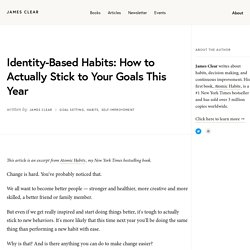
Change is hard. You've probably noticed that. We all want to become better people — stronger and healthier, more creative and more skilled, a better friend or family member. But even if we get really inspired and start doing things better, it's tough to actually stick to new behaviors. It's more likely that this time next year you'll be doing the same thing than performing a new habit with ease. Why is that? How to Be Good at Remembering People’s Names My wife is great at remembering people’s names. Recently, she told me a story that happened when she was in high school. My wife raised her hand and proceeded to go around the room and accurately name all 30 or so people. She said that moment was an affirming experience for her. Even today, she's great at remembering the names of anyone we come across.
4 Simple Habit Building Systems Used (And Perfected) By Top Performers. Habits are as powerful as they mysterious.
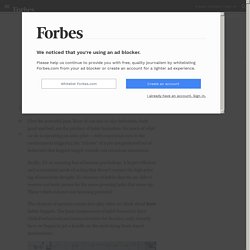
First the powerful part. Habit. Routine of behavior that is repeated regularly and tends to occur subconsciously A habit (or wont as a humorous and formal term) is a routine of behavior that is repeated regularly and tends to occur subconsciously.[1][2][3] A 2007 study by Wood and Neal found that when behaviors are repeated in a consistent context, there is an incremental increase in the link between the context and the action.
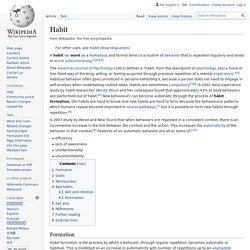
The Power of Habit. Book by Charles Duhigg The Power of Habit: Why We Do What We Do in Life and Business is a book by Charles Duhigg, a New York Times reporter, published in February 2012 by Random House.
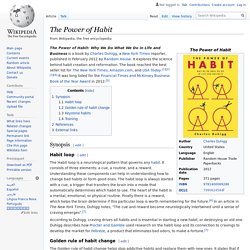
It explores the science behind habit creation and reformation. The book reached the best seller list for The New York Times, Amazon.com, and USA Today.[1][2][3][4] It was long listed for the Financial Times and McKinsey Business Book of the Year Award in 2012.[5] Synopsis[edit]
Downtime. Time Blindness. Time Management and Productivity Advice for Adults with ADHD. Daily Schedules for Kids with ADHD: Parenting w/ Routines. Pomodoro timer for your productivity tool: Trello, Asana, Todoist, Evernote - PomoDoneApp. Pomodoro Timer for Google Tasks - PomoDoneApp. Daily Schedules for Kids with ADHD: Parenting w/ Routines.